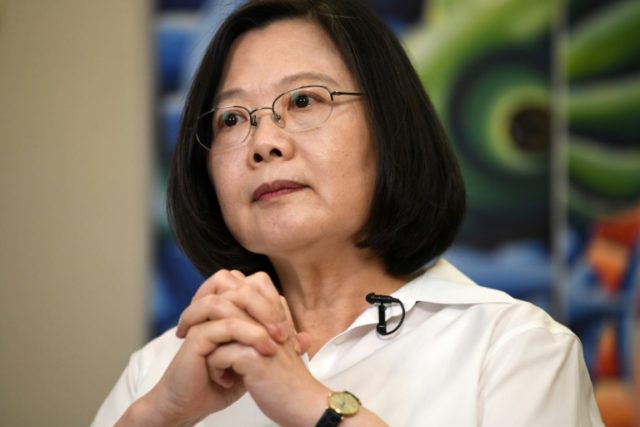In an interview with CNN conducted Monday and posted in full on Thursday, Taiwanese President Tsai Ing-wen warned other Asian nations they could be the next targets of Chinese aggression, which increasingly includes military threats along with diplomatic and economic pressure.
“If it’s Taiwan today, people should ask who’s next? Any country in the region, if it no longer wants to submit to the will of China, they would face similar military threats,” Tsai said.
“I believe this is not just an issue of Taiwan under attack, but a reflection of China’s willingness to use force for its expansionist policy. It’s not just Taiwan’s interests at stake, it’s the whole region’s or even the whole world’s,” she cautioned.
Tsai said that despite electoral reverses for her party in the 2018 midterm elections, she intends to run for re-election in 2020. Her re-election is a prospect CNN predicted Chinese Communist Party leader Xi Jinping is “unlikely to welcome,” given that China’s pressure campaign against Taiwan shifted into overdrive with the election of the independence-minded Tsai.
Tsai said Xi’s refusal to renounce the use of force in a January speech “caused concern within Taiwan,” which views the steady loss of autonomy in Hong Kong and Macau with unease.
She said the Taiwanese are not intimidated or dismayed by China’s threats, instead declaring each new Chinese effort to isolate, weaken, and demoralize the island “has only further upset and alienated the Taiwanese people.”
Anticipating the possibility that China could lash out in frustration, Tsai said the Taiwanese military is upgrading its capabilities to keep pace with the Chinese and maintain the balance of power that would make a Chinese invasion costly and impossible to pull off before the rest of the world would respond.
Tsai expressed gratitude for President Donald Trump’s support, although she acknowledged the U.S. trade war with China has negatively impacted the Taiwanese economy.
“There’s a lot of trade and economic flow between Taiwan and the US as well as investment and trade with China. We have to make sure that we can lessen the impact of any kind of uncertainty on Taiwan’s economy,” she explained.
To that end, Tsai helpfully suggested that Western nations worried about using potentially compromised Chinese products in their next-generation computer networks might consider shopping Taiwan’s very capable and “very secure” tech marketplace.
Tsai held off on endorsing the idea of visiting Washington to address the U.S. Congress or meet with Trump at the White House, moves that would surely enrage Beijing.
“It’s not a simple question of invitation and acceptance. Whether or not to go deliver a speech in Washington would depend on whether such a move benefits Taiwan, our relations with the US and regional stability,” she said diplomatically.
China’s Foreign Ministry and Taiwan Affairs Office did not immediately respond to Tsai’s CNN interview, but the state-run Global Times gave her thumbs-down as soon as the first excerpts were released, focusing largely on mocking Tsai’s announcement that she will run for re-election and ominously presenting her candidacy as evidence that China must “gradually regulate Taiwan’s elections around the borders of cross-Straits questions.”
The Global Times predicted Tsai will “undoubtedly play the cross-Straits card in the election” and damage the fragile peace between China and Taiwan, because “her chances of winning are extremely low if she doesn’t stir things up.”
Describing Tsai as a “leading warrior of radical forces in Taiwan,” the Chinese paper said Beijing “cannot intervene in the elections, but if Tsai and anyone else violate China’s Anti-Secession Law, we must crack down on them.” (Taiwanese security officials would strongly disagree with the false humility of the Global Times’ assertion that China cannot intervene in Taiwanese elections, as they are convinced China did exactly that in the 2018 local races that went so badly for Tsai’s party).
The editorial concluded by dropping menacing hints the crackdown might involve bombs and bullets by advising Chinese leaders to “dare to use and be skilled at using” all of the “helpful resources” provided by China’s growing strength.
“Tsai must pay if she relies on Taiwan independence forces to win the election. The Chinese mainland must take actions even if it is also costly for us,” the Global Times urged, issuing a thinly-veiled challenge to Taiwan’s defensive strategic doctrine of making a Chinese invasion too costly to contemplate.
The Washington Post on Monday explored signs that China is growing impatient with Taiwan and leaning toward taking more dramatic action, having concluded the Taiwanese are unlikely to voluntarily reunify with the mainland, particularly as their apprehension over China’s treatment of Hong Kong intensifies. There is not much happening in Hong Kong these days that would persuade anyone to trust Chinese promises of limited autonomy.
According to the Post’s sources, Chinese officials close to Xi are measuring the “political reliability” of Taiwanese living in mainland China, shopping around for Taiwanese candidates that support unification and would welcome campaign help from Beijing, and passing around white papers about the feasibility of effectively blockading Taiwan or even invading with the active assistance of fellow global villains Russia, North Korea, and Iran.
The Taiwanese, meanwhile, seem every bit as alarmed by Xi’s January speech as Tsai portrayed them in her CNN interview. Some think the time has come to pull the trigger on full independence, forcing the issue before the Chinese dragon decides it has grown big enough to swallow Taiwan whole.
The Taipei Times on Wednesday quoted independence activists who want Tsai to bow out of the 2020 race because they fear her weakened candidacy could make it possible for the pro-Beijing Chinese Nationalist Party to win the election.

COMMENTS
Please let us know if you're having issues with commenting.